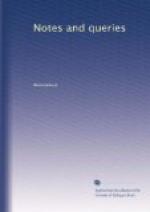“Of ten chapters he omitteth three without mention.”
I.B.
* * * * *
FURTHER NOTES ON THE DERIVATION OF THE WORD “NEWS.”
I have too much respect for the readers of “NOTES AND QUERIES” to consider it necessary to point out seriatim the false conclusions arrived at by MR. HICKSON, at page 81.
The origin of “news” may now be safely left to itself, one thing at least being certain—that the original purpose of introducing the subject, that of disproving its alleged derivation from the points of the compass, is fully attained. No person has come forward to defend that derivation, and therefore I hope that the credit of expunging such a fallacy from books of reference will hereafter be due to “NOTES AND QUERIES”.
I cannot avoid, however, calling Mr. Hickson’s attention to one or two of the most glaring of his non-sequiturs.
I quoted the Cardinal of York to show that in his day the word “newes” was considered plural. MR. HICKSON quotes me to show that in the present day it is used in the singular; therefore, he thinks that the Cardinal of York was wrong: but he must pardon me if I still consider the Cardinal an unexceptional authority as to the usage of his own time.
MR. HICKSON asserts that “odds” is not an English word; he classifies it as belonging to a language known by the term “slang,” of which he declares his utter disuse. And he thinks that when used at all, the word is but an ellipsis for “odd chances.” This was not the opinion of the great English lexicographer, who describes the word as—
“Odds; a noun substantive, from the adjective odd.”
and he defines its meaning as “inequality,” or incommensurateness. He cites many examples of its use in its various significations, with any of which MR. HICKSON’s substitution would play strange pranks; here is one from Milton:—
“I chiefly who enjoy
So far the happier lot, enjoying thee
Pre-eminent by so much odds.”
Then with respect to “noise,” MR. HICKSON scouts the idea of its being the same word with the French “noise.” Here again he is at odds with Doctor Johnson, although I doubt very much that he has the odds of him. MR. HICKSON rejects altogether the quasi mode of derivation, nor will he allow that the same word may (even in different languages) deviate from its original meaning. But, most unfortunately for MR. HICKSON, the obsolete French signification of “noise” was precisely the present English one! A French writer thus refers to it:—
“A une epoque plus reculee ce mot avait un sens different: il signifiait bruit, cries de joie, &c. Joinville dit dans son Histoire de Louis IX.,—’La noise que ils (les Sarrazins) menoient de leurs cors sarrazinnoiz estoit espouvantable a escouter.’ Les Anglais nous ont emprunte cette expression et l’emploient dans sa premiere acception.”
MR. HICKSON also lays great stress upon the absence, in English, of “the new” as a singular of “the news.” In the French, however, “la nouvelle” is common enough in the exact sense of news. Will he allow nothing for the caprice of idiom?




